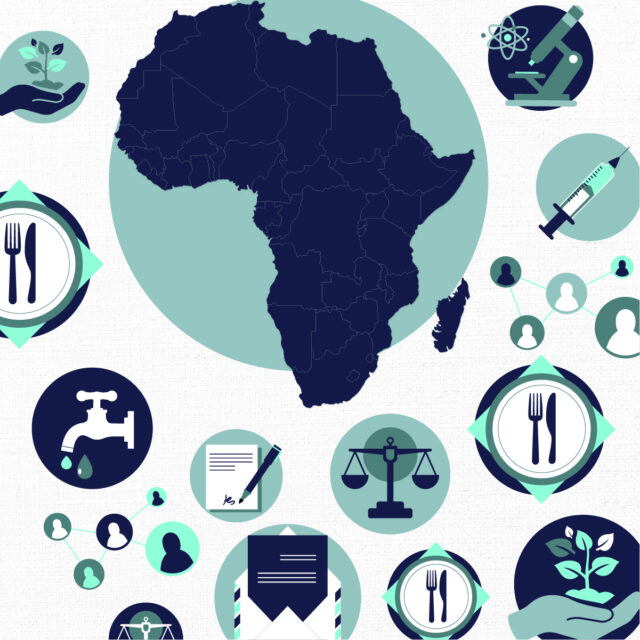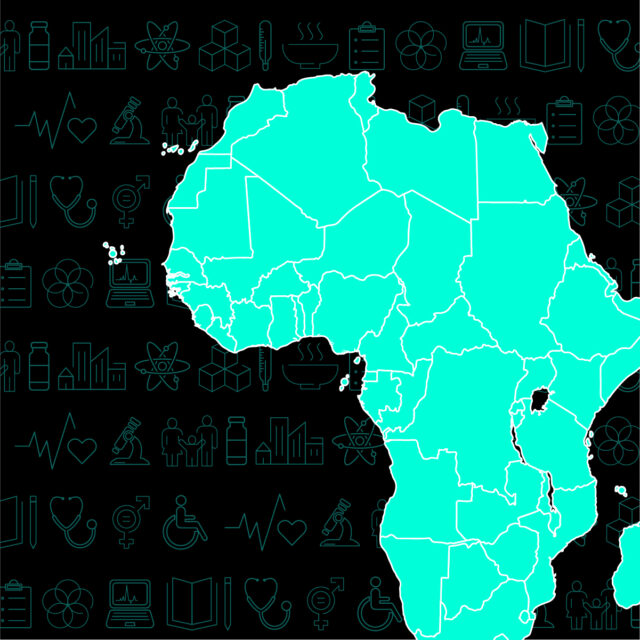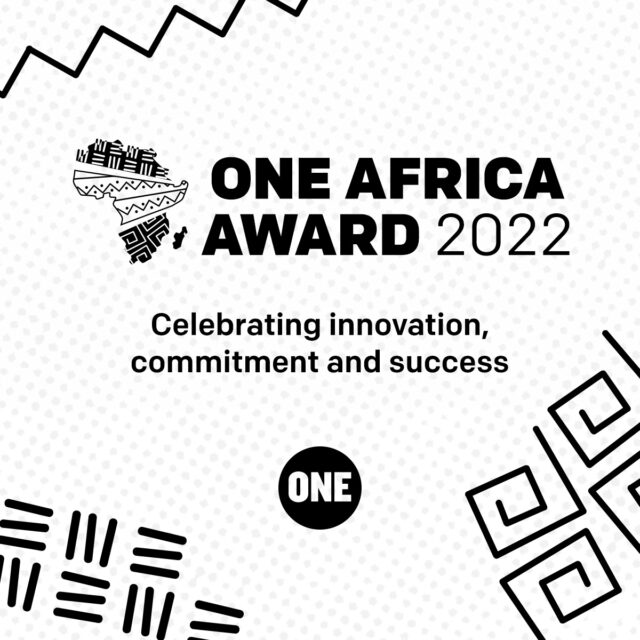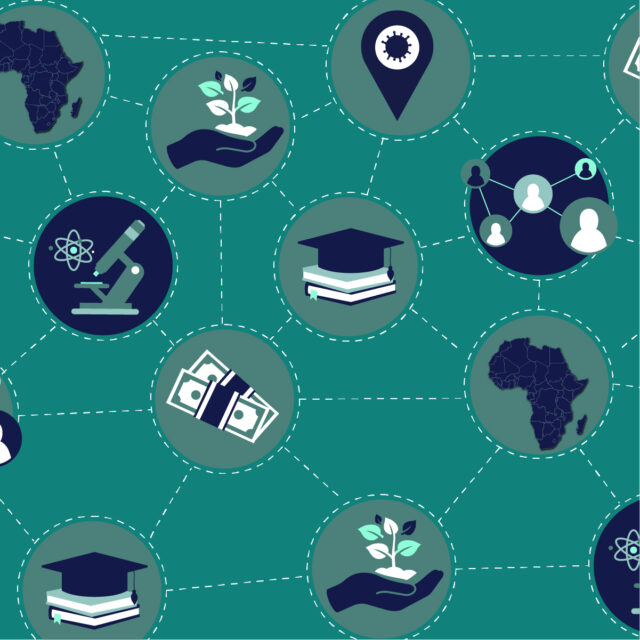A roundup of the latest news, stats, and analysis of COVID-19’s impact in Africa. View our data tracker and sign up for our weekly newsletter, and read on for the latest on how under-resourced health systems are contributing to high COVID-19 death rates in Africa, the prospects of a global pandemic treaty, and the ONE Community’s Africa Day celebrations.
Top news
Disturbing discrepancy: If you become severely ill with COVID-19 in Africa, you have about a 50-50 chance of surviving. New data from The Lancet shows that Africa’s mortality rate among critically ill COVID-19 patients is 48.2%, far higher than the global average of 31.5%. To put that in perspective, this means that out of every 100 critical care patients, around 17 more will die in Africa.
Resource limited: This shocking finding can be attributed to weak health systems, particularly a lack of hospital and critical care resources. The Lancet study found just one in two patients referred to intensive care units were actually admitted due to a shortage of beds, and there is poor access to life-saving treatments such as dialysis and oxygen. Dr. Vanessa Msosa, one of the study’s co-authors, said that “patient outcomes will continue to be severely compromised until the shortfall in critical care resources is addressed.”
The day after tomorrow: ONE’s Africa COVID-19 Tracker shows that, so far, Africa has reported 4.8 million confirmed cases, representing just 3% of global cases. And yet, the spread of new variants on the continent has led to fears that Africa could yet experience a calamitous surge in infections similar to what has unfolded in India in recent weeks, with the head of the Africa Centres for Disease Control and Prevention warning that India’s COVID crisis should be a wake-up call. The Africa COVID Community Vulnerability Index shows (broken down to the sub-national level) just how frightening a prospect this is for the continent. While insufficient capacity within many African health systems exacerbates vulnerability, approximately one African-trained physician has migrated to the US per day over the past decade.
Or maybe today?: And on cue, we have seen a severe spike in infections in some African countries, including in South Africa, where there are reports of hospital bed shortages amid a “third wave of infections,” and even in Seychelles, where up to 71% of people have been vaccinated (57% with Sinopharm and 43% with AstraZeneca). The UN Economic Commission for Africa said cases across Africa increased by 17% last week.
Scandalous inequity: Meanwhile, world leaders have been dialing in this week for the 74th World Health Assembly. WHO head Dr. Tedros Adhanom Ghebreyesus kicked off the summit by lambasting the “scandalous inequity” in the global COVID-19 vaccine rollout. Highlighting that just 10 countries account for 75% of all doses administered, Tedros urged leaders to ensure that at least 10% of the population of every country is vaccinated by September, and 30% by the end of this year. Japan will host a summit on 2 June in an effort to raise $2 billion for COVAX.
Pandemic treaty in the works?: Also high on the agenda at the WHA was the prospect of a global “Pandemic Treaty.” The WHA agreed to convene another special session in November 2021 to “consider the benefits” of such a treaty to strengthen global pandemic preparedness. The idea has been backed by some heavy hitters, including German Chancellor Angela Merkel, but it appears that others, such as the US, are not as hot on the idea. Watch this space!
CAR gets rolling: The Central African Republic, one of the last countries in the world to receive doses of COVID-19 vaccines, launched its immunization campaign last week, after receiving 60,000 doses of the AstraZeneca vaccine through COVAX. It’s hoped that a second shipment of vaccines will arrive in the near future, amid concerns about rising infections in the country.
Sharing is caring: Despite being some of the chief culprits in rich countries’ hoarding of the global COVID-19 vaccine supply, EU leaders have earned some kudos by committing to donate a further 100 million doses to lower- and middle-income countries by the end of this year. The vaccines are to be donated in particular through COVAX. European Commission President Ursula von der Leyen also announced a €1 billion EU initiative to boost vaccine manufacturing and access in Africa.
J&J for Gavi: In another much-needed piece of good news for the recently beleaguered COVAX scheme, Gavi signed an agreement this week to purchase 200 million doses of the Johnson & Johnson vaccine. It is expected that the vaccines will be made available to COVAX in 2021. Gavi CEO Dr. Seth Berkley said that “as a one-dose vaccine, the J&J vaccine has particular relevance for places with difficult infrastructure.”
China’s pandemic diplomacy: China has said that it supports a proposal to redistribute IMF Special Drawing Rights (SDRs) from major economies to lower-income African countries to help them recover from the economic impact of COVID-19. As Africa’s biggest bilateral creditor, China has also provided at least $10.7 billion in debt relief to Africa in 2020 and 2021 alone. This, along with the Chinese foreign ministry pledging to provide free COVID-19 vaccines to African countries, points to how China is using the crisis to boost its growing influence on the continent.
Yellen into the void: Last week we reported that US Secretary of the Treasury Janet Yellen publicly supported the expansion of the Common Framework, a G20 agreement designed to help countries with debt sustainability, to all lower- and middle-income countries. Such a move could help alleviate debt burdens in an additional 13 countries, but still excludes some vulnerable upper-middle-income countries. Still, G7 finance ministers should back the plan when they meet in London next week (and at their virtual meeting on Friday) and agree to push it at the G20.
Severe financial pain: NGOs working across Africa are bracing for “severe financial pain” in the wake of the UK Government’s wrong-headed decision to slash its foreign aid spending from 0.7% of GNI to 0.5%. A growing group of Tory rebels may force Boris Johnson’s hand on the issue. Meanwhile, the decision could jeopardise progress at the Global Education Summit chaired by Johnson and Kenyan president Uhuru Kenyatta two months from today. It’s hard to ask others to pledge big when you’re cutting funding to girl’s education by 40%. The summit aims to raise $5 billion. So far 6% of the target has been pledged.
Astonishing financial gain: The IMF has calculated that an urgent $50 billion investment, primarily by rich countries, to vaccinate people in lower-income countries would yield an astonishing $9 trillion in additional economic growth by 2025 by ending the pandemic sooner. The IMF proposal would see 40% of the global population vaccinated by the end of the year and at least 60% by the first half of 2022. Kristalina Georgieva, IMF Managing Director, says it would probably be “the highest return on public investment in modern history.”
Happy Africa Day!: 25 May was Africa Day, which commemorates the founding of the present-day African Union. The ONE community turned out in style (virtually, of course) to celebrate the occasion. Check out what our ONE Champions in Africa had to say.
The numbers
- 596,968: The number of vaccines administered in Africa on 23 May, the highest daily total yet.
- 8.3 million: the number of people in South Sudan likely to need humanitarian assistance in 2021. According to new UN figures, the economic impact of COVID-19, as well as the climate crisis, have pushed more than 7 million people into food insecurity.
- 0.5%: How much the Nigerian economy has grown in the first quarter of 2021, following the gradual easing of coronavirus restrictions. The boost has been attributed to higher oil prices.
Other reads
- Many governments failed to manage funding for their COVID-19 responses in a transparent and accountable way. This is according to a new report from the International Budget Partnership, which highlights this “accountability gap” and argues that urgent action does not have to come at the expense of accountability.
- Rich nations have an opportunity to reset and build global resilience in the aftermath of the pandemic. So argues Bill Emmott, Co-Director of the Global Commission for Post-Pandemic Policy, in the FT.
- Zanzibar has become the world’s COVID conspiracy capital. A VICE article explores how the island has become a hotspot for COVID-weary and COVID-sceptic travellers.
- How has the pandemic affected armed conflict and political violence within African countries? A briefing paper from the German Development Institute outlines how “the consequences of the pandemic are very likely to accelerate violent conflict in the medium to long-term.”



